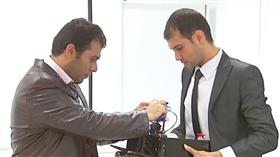Two Iraqi students, studying at Adelaide's Flinders University, have developed new technology to detect human lives through remote cameras. This invention can benefit rescue operations immensely.
Through an Iraqi Government initiative that sends students abroad, Laith Al-Shimaysawee and Ali Al-Dabbagh are studying their masters on scholarships.
They have designed new algorithm to detect people through color and thermal cameras, which is faster to detect human lives than any other available technologies. Current technology requires hundreds of samples to be processed and compared before a person can be detected.
Mr. Al-Dabbagh said, "We developed it so it can use less samples, for example the system that is currently in the world, sometimes they use 500, and some of them use 1000 samples."
"With our system that we developed we use just eight samples."
Their university supervisor, Doctor Nasser Asgari, said fewer samples made detection much faster.
"This is the fastest algorithm that we have come up with, and all the other ones are slower than this and the accuracy of this system is better than what we know of," he said.
The system has been developed to help with rescue operations, and other high-risk situations.
"You can put it on a robot, or rescue people can carry it with them as a helmet, they can wear it, or they can put it on a dog on a helmet, and they can go to different, difficult scenarios, collapsed building or unstable structures and it can detect people and report back to the rescue," Dr. Asgari said.
He added, "The system will do one scan and say if there's something there or not and you move to the next one, rather than going everywhere and spending hours and hours just to do that, and that could be the differentiation between life and death really."
The Invention Could Help Iraq’s Army
The students will return to Iraq later this year and hope to use their work at Flinders University to help the Iraqi army.
Mr. Al-Dabbagh said, "Nowadays the terrorists, what they do is that they put bombs in the houses and they leave and when the army comes they just open the house and they explode, and they can for example use the robot for this purpose."
He added, "We thought we should try to do something to help our country, and to save the life of people in our country as you know the situation in our country now is not good."
He said he is extremely grateful to have studied in Australia.
He also added, "In Iraq there are a lot of young engineers, they just need an opportunity or support and they can do a lot of things to help Iraq."
Their work will be published at an international robotics conference in Dubai next month. The engineers came to Adelaide from their home city of Najaf, south of Baghdad, on a scholarship.
|

